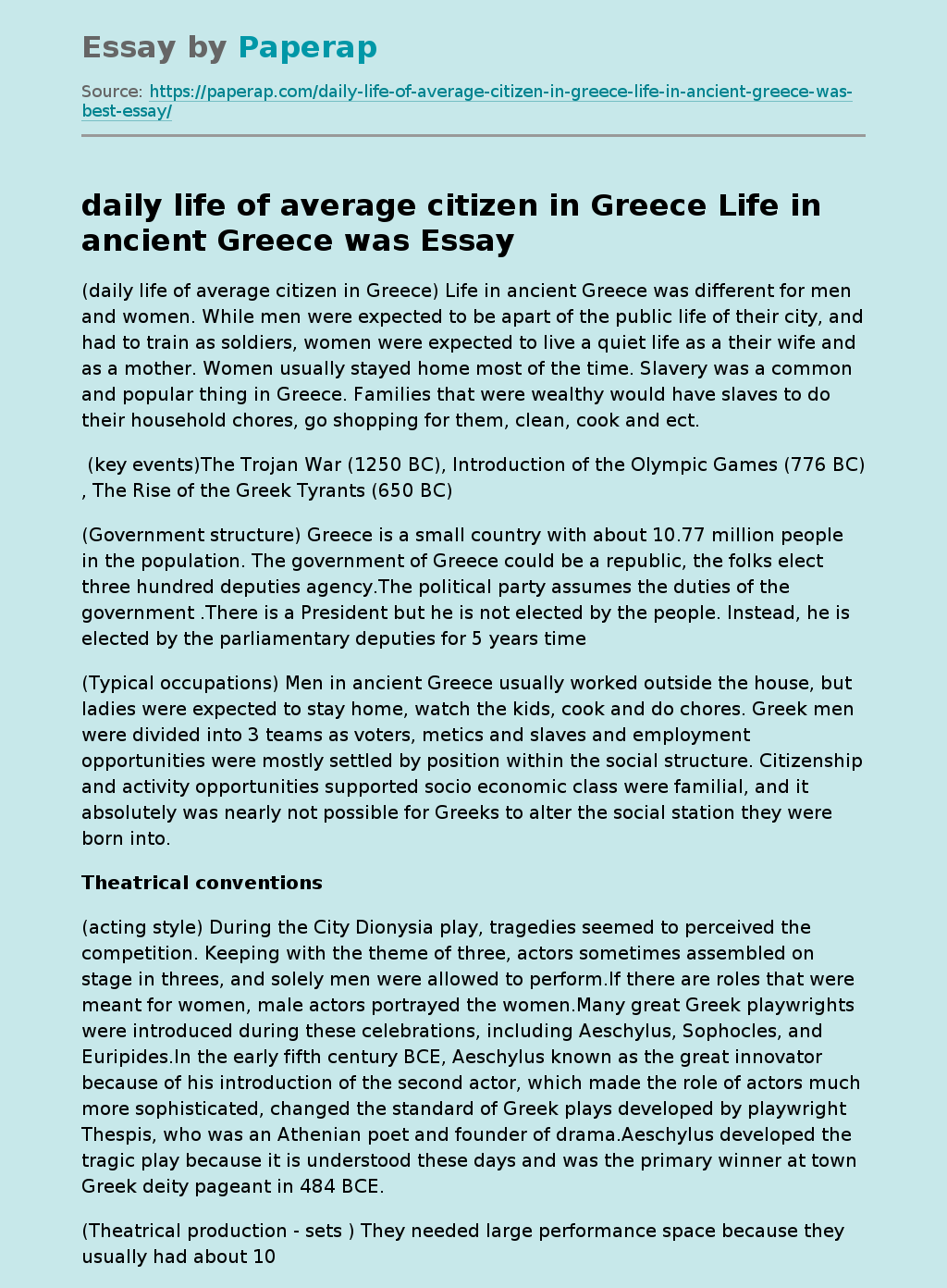daily life of average citizen in Greece Life in ancient Greece was
(daily life of average citizen in Greece) Life in ancient Greece was different for men and women. While men were expected to be apart of the public life of their city, and had to train as soldiers, women were expected to live a quiet life as a their wife and as a mother. Women usually stayed home most of the time. Slavery was a common and popular thing in Greece. Families that were wealthy would have slaves to do their household chores, go shopping for them, clean, cook and ect.
(key events)The Trojan War (1250 BC), Introduction of the Olympic Games (776 BC) , The Rise of the Greek Tyrants (650 BC)
(Government structure) Greece is a small country with about 10.77 million people in the population. The government of Greece could be a republic, the folks elect three hundred deputies agency.The political party assumes the duties of the government .There is a President but he is not elected by the people. Instead, he is elected by the parliamentary deputies for 5 years time
(Typical occupations) Men in ancient Greece usually worked outside the house, but ladies were expected to stay home, watch the kids, cook and do chores.
Greek men were divided into 3 teams as voters, metics and slaves and employment opportunities were mostly settled by position within the social structure. Citizenship and activity opportunities supported socio economic class were familial, and it absolutely was nearly not possible for Greeks to alter the social station they were born into.
Theatrical conventions
(acting style) During the City Dionysia play, tragedies seemed to perceived the competition.
Keeping with the theme of three, actors sometimes assembled on stage in threes, and solely men were allowed to perform.If there are roles that were meant for women, male actors portrayed the women.Many great Greek playwrights were introduced during these celebrations, including Aeschylus, Sophocles, and Euripides.In the early fifth century BCE, Aeschylus known as the great innovator because of his introduction of the second actor, which made the role of actors much more sophisticated, changed the standard of Greek plays developed by playwright Thespis, who was an Athenian poet and founder of drama.Aeschylus developed the tragic play because it is understood these days and was the primary winner at town Greek deity pageant in 484 BCE.
(Theatrical production – sets ) They needed large performance space because they usually had about 10,000 people watching them at one time. Greek plays were performed in an outdoor theater, used masks, and were nearly always performed by a chorus and 3 actors, regardless of what percentage speaking characters there have been in the play, solely 3 actors were used; the actors would go backstage when taking part in one character, switch masks and costumes, and reappear as another character.Greek plays were performed as a part of non secular festivals in honor of the god Greek deity, and unless later revived, were performed just once.Plays were funded by the polis, and always presented in competition with other plays, and were voted either the first, second, or third place.
(Theatrical production -costumes) Costumes, alongside masks and props, helped indicate the standing, gender, and age of a temperament.Athenian characters wore additional elaborate, embellished versions of everyday vesture, such as a tunic or undergarment, a cloak or over-garment (himation).Costumes for characters that were non-Athenians were loads of outlandish.Tragic actors wore buskins (raised platform shoes) to symbolize superior standing, whereas comic actors wore plain socks.When portrayal girls, actors wore (raised platform shoes to symbolize superior standing, while comic actors wore plain socks.When theyre acting like ladies, actors wore body stockings, with a progastreda and a prosterneda to make their bodies appear feminine.Some plays even concerned actors to wear animal costumes.
(Theatrical production -lightning) The evolution of lighting in theatre began throughout the days of Ancient Greek.The performances was outside in Associate in Nursing outdoor area, that the employment of natural lightweight was the first supply of illumination.The production would take place during the day time so that the sun light can be used. Productions used the main theatre layout of ‘theatre in the round’ and plays was done at high noon when most everything was illuminated. Plays were done at certain times of the day, so the height and angle of the sun’s natural light could enhance the scene.The Greeks also used massive mirrors with the sun’s lightweight to change the lighting for their plays.It was once the Roman theatre developed with a lot of insights from the Greeks, that they began to use torches and candles.This gave the Roman theatre players a chance to perform within the evenings because the use of torches light their scenes.
(Theatrical production- sound) The Greeks knew how sound traveled with their stepped seating structure, within the one st century B.C., Vitruvius, a Roman designer, used the Greek structure to create new theatres, however he had a deeper understanding of sound as he was better-known to be the first to say that sound travels in waves like ripples after a stone is thrown in water.His work was instrumental in making the basis of modern subject acoustic design.
daily life of average citizen in Greece Life in ancient Greece was. (2019, Nov 16). Retrieved from https://paperap.com/daily-life-of-average-citizen-in-greece-life-in-ancient-greece-was-best-essay/

